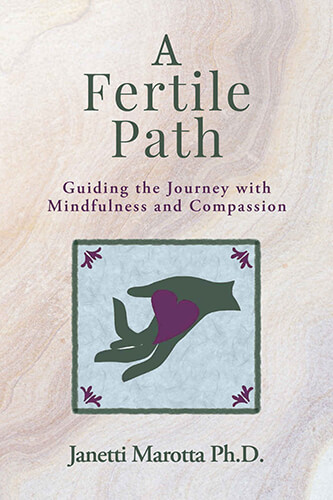Mindfulness has become extremely popular over the past decade . . . and for good reason. Our lives seem to be more stressful and full of anxiety than ever, and we need a way to find equanimity in the face of it all. In its essence, mindfulness is learning to accept reality for what it is with a sense of peace and stability so that we can better deal with life’s challenges.
One of the biggest challenges that life can throw at us is infertility.
Why is infertility viewed as a life crisis? Infertility reaches into the most important areas of our lives: our relationships, our careers, our finances, and especially our sense of self. It is typically experienced as one of the most difficult situations ever encountered. Unlike previous endeavors, effort does not equate with success, thus attempts to gain control over a situation that lies outside control, only heightens a sense of insecurity. And, because infertility challenges the inherent assumption that we can have children whenever we choose—that procreation is a birthright—the inability to father a child or become pregnant becomes a personal catastrophe.
Though infertility is a medical condition, it is experienced as a redefinition of self, challenging our core identity of what it means to be a man or woman. In the process, the very qualities most needed are least accessible. Here rests a core paradox: How has it come to be, that in this very quest to bring new life into the world, we bring with us so little life of our own?
Mindfulness is opening to the present moment just like it is, whether it’s pleasant or unpleasant, without clinging to it or pushing it away. You learn to relinquish control not by trying to change, get rid of, or judge the situation—in this case infertility—but rather by changing your relationship to what’s happening. Mindfulness provides the vehicle for you to become the change itself. As you do this, you cultivate the cornerstone quality of acceptance: a state of open receptivity, a willingness to turn toward that which you resist. Paradoxically, when you accept things as they are, you are better able to assess the situation, find your strength, make wise choices, and take wholesome actions.
There is so much in life you can’t control, and your efforts to try to change what you don’t want only intensify the problem. When you let go of control, insecurity, and rigidity, you open, release, and let things be. You are shifting from the coping mechanism of control—trying to change what is—to acceptance by being with what is.
With awareness as the midwife, mindfulness teaches you to relax, release, and let go: to breathe through every contraction of clinging to what you want or pushing away what you don’t want and to open to the unfolding process of life. Through repeated practice, you learn resistance is how you get stuck and acceptance is how you break free.
More than a stress-reduction technique, mindfulness is a way of being—a method of meeting what Taoists call “the ten thousand joys and the ten thousand sorrows” inherent in the human experience. Mindfulness cultivates the qualities you most need, such as non-judgment, patience, and trust, and transforms the most insurmountable obstacles and plights into challenges and opportunities for growth.
Mindfulness rests at the center of Buddhist psychology and finds wisdom in paradox. For this very reason, mindfulness becomes the perfect antidote for the paradoxical land mines infertility presents. Mindfulness starts from the perspective that you are whole and complete already, regardless of flaws or imperfections. It is based on the concept of original goodness: your essential nature is good and pure. Proceeding from this vantage point gives you freedom from the bondage of inadequacy and insecurity.
Mindfulness challenges assumptions about who you are and why you are doing what you are doing. Through mindful inquiry, you look deeply into such questions:
“Is infertility the obstacle, or is fertility the challenge?”
“Is infertility happening to me or for me?”
“Is my true longing pregnancy or parenthood?
“Is infertility the loss of a dream or a dream not awakened?”
It’s not about following the prescription that leads from point A to point B; rather, it’s answering the invitation to drop into your heart—to come full circle on the wheel of paradox that starts with loving yourself just as you are and ends with loving yourself just as you are. Through this gateway, you give birth to yourself.
Janetti Marotta, PhD, is a psychologist who has specialized in every area of infertility since 1990. In partnership with ARC Fertility, she is the author of A Fertile Path: Guiding the Journey with Mindfulness and Compassion (2018). This step-by-step guide offers strategies to work with the challenges of fertility and support to develop the necessary resilience. This blog features excerpts from the book. To purchase A Fertile Path from the ARC Fertility website, go to arcfertility.com/fertilitymarketplace.


